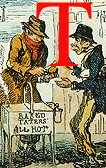In the years just prior to and through the course of Dickens's publishing Great Expectations serially in All the Year Round, what were Victorians reading?
1859
- William Harrison Ainsworth's The Combat of the Thirty
- Charles Dickens's A Tale of Two Cities (serialised)
- George Eliot's Adam Bede
- George Meredith's The Ordeal of Richard Feverel
- Charles Reade's The Cloister and the Hearth (serialised)
- William Makepeace Thackeray's The Virginians (serialised)
- Bulwer Lytton's What Will He Do with It? by Pisistratus Caxton (serialised) 1st-person
1860
- Wilkie Collins's The Woman in White (serialised)
- George Eliot's The Mill on the Floss
- George Meredith's Evan Harrington (serialised)
- William Makepeace Thackeray's Lovel the Widower (serialised)
- Charles Kingsley's Hereward the Wake (serialised)
- William Harrison Ainsworth's Ovingdean Grange: A Tale of the South Downs (serialised)
1861
- George Eliot's Silas Marner
- Anthony Trollope's Framley Parsonage (serialised)
- Mrs. Henry Wood's East Lynne
- Charles Dickens's Great Expectations (serialised)
- William Harrison Ainsworth's The Constable of the Tower (serialised)
 he overlapping intertextuality produced by the interaction of Victorian part-publication, magazine serialisation, and volume publication sets the period apart from others in the history of the British novel. For instance, while Mary Anne Evans (George Eliot) was engaged in the writing of Silas Marner for volume publication, 28 November 1860 through 10 March 1861, she reports herself pondering the pathetic figure of the Bastille prisoner, Dr. Alexandre Manette, “recalled to life" after eighteen years of isolation in Dickens's A Tale of Two Cities, which ended its serial run in All the Year Round on 26 November, 1859.
he overlapping intertextuality produced by the interaction of Victorian part-publication, magazine serialisation, and volume publication sets the period apart from others in the history of the British novel. For instance, while Mary Anne Evans (George Eliot) was engaged in the writing of Silas Marner for volume publication, 28 November 1860 through 10 March 1861, she reports herself pondering the pathetic figure of the Bastille prisoner, Dr. Alexandre Manette, “recalled to life" after eighteen years of isolation in Dickens's A Tale of Two Cities, which ended its serial run in All the Year Round on 26 November, 1859.
However, as an avid consumer of Dickens's novels, she had probably read the first fifteen parts of Great Expectations in that same journal from 1 December 1860 through 9 March 1861, during the course of working on Silas Marner, as well as almost all of Trollope's Framley Parsonage in the Cornhill Magazine (of its sixteen parts, all but two had already been published by early March, 1861), the first three parts of Ainsworth's The Constable of the Tower (if she were so inclined) in Bentley's Miscellany, and the last monthly number of Charles Kingsley's historical novel Hereward the Wake in Good Words. Thus, although she was definitely influenced by the total text of A Tale of Two Cities (published in volume in November, 1859), she may well have been affected by parts of a number of other best-sellers. Furthermore, Dickens himself, prior to seeking Bulwer-Lytton's advice about the conclusion of Great Expectations could have been influenced by the happy ending of Eliot's Silas Marner, to say nothing of Ainsworth's The Constable of the Tower, Thackeray's The Adventures of Philip (which started shortly after Great Expectations, so the similarity in the protagonists' names is probably mere coincidence), all of Trollope's Framley Parsonage, and countless other minor works that he was reading in his capacity as editor and “conductor" of the weekly journal All the Year Round.
Related Materials for Positioning Great Expectations
[Capital “T" based on George Cruiskshank's Comic Alphabet.]